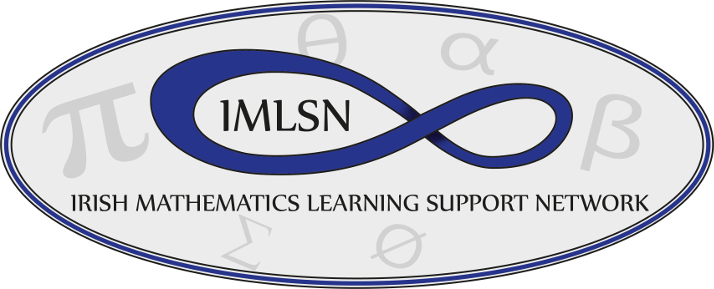Date: Friday 31st January, 2014.
Location: Institute of Technology Tallaght.
Workshop Theme: ‘Diversity: challenges and opportunities-enabling and supporting mathematics learning in a diverse student population’.
The population of students studying mathematics as part of their higher education is increasingly diverse. This diversity manifests itself in many ways but in particular:
- A higher proportion of students entering higher education are not coming straight from second level.
- The number of students with particular learning needs is increasing.
The conference was hosted by the Institute of Technology Tallaght and the Dublin Institute of Technology.
Organisers
- Ciaran O’Sullivan, Institute of Technology Tallaght.
- Cormac Breen, Dublin Institute of Technology.
Workshop Report
Keynote Speakers:
The first keynote presentation was by Clare Trott of Loughborough University.
Title: Mathematics Support: helping the neurodiverse student overcome their barriers.
Abstract: There is an increasingly diverse population of students entering Higher Education (H.E.). While this enriches the environment it can bring challenges that H.E. institutions, and in particular mathematics support, need to address. This presentation will look at neurodiversity: dyslexia, dyspraxia, dyscalculia, Asperger's syndrome and AD(H)D. The presentation will explore the mathematical and statistical barriers that neurodiverse students can face and suggest ways in which mathematics and statistics support can be provided in order to enable the SpLD student to overcome the barriers and succeed. There will be some illustrative exemplar case studies.
A pdf of the presentation can be downloaded here.
The second keynote presentation was by Dr. Terry Maguire, Chair of Adults Learning Mathematics – An International Research Forum and Director of the National Forum for the Enhancement of Teaching and Learning in Higher Education.
Title: Adult learners and Mathematics Support: Getting to the Root of the Problem.
Abstract: Every adult learner that walks through the door of a Maths Support Centre comes in with a difficulty with some aspect of mathematics that they need some help with. However these learners bring with them a range of attitudes and beliefs that they have developed because of their experience of school and their real life mathematics since they left school. Research has shown that adults and their own relationship with mathematics can impact the way that they respond to and are receptive to the help that is offered. This paper will discuss the range and nature of issues that can act as a barrier to adult learners being receptive to the assistance that is made available to them. It will suggest some strategies that can be used by Maths Support Centre staff to identify the root problem and thus be able to tailor their support more effectively to the needs of individual adult learners.
A pdf of the presentation can be downloaded here.
Short talks:
The first short talk was by Dr. Brien Nolan and Dr. Eabhnat Ní Fhloinn from Dublin City University.
Title: Can group-work work? Notes on group-work based tutorials in a large service teaching module.
Abstract: We report on a teaching project that involved the use of peer-supported group-work tutorials in a large (N = 398) service teaching module in Dublin City University. We describe the background and motivation for the project, and its design and execution. This includes a corresponding tutor training element. We report on feedback on the tutorials obtained from students and tutors, and discuss the students' performance on the module assessments in the light of the group-work tutorials. We found little evidence of success in the project, and attempt to relate this to existing conceptual frameworks describing the effective implementation of group-work.
A pdf of the presentation can be downloaded here.
The second short talk was by Dr. Anthony Cronin from University College Dublin.
Title: Supporting Mathematics Learning for Adult Learners via Maths Software.
Abstract: This year at the maths support centre at UCD we decided to support the adult learners from the access to science and engineering programmes by giving them access to a new personalised adaptive learning software system developed here in Dublin (realizeit). The students took a (pre)-test consisting of 12 elementary math questions dealing with the basics of arithmetic and stats. The students then used the system for 50 days and took the same (post)-test. The students observations of the system as a support mechanism as well as their performance on the tests will be discussed here.
A pdf of the presentation can be downloaded here.
The third short talk was by Dr. Olivia Fitzmaurice of the University of Limerick, Mr. Ciaran O’Sullivan of the Institute of Technology Tallaght, Dr. Ciarán Mac an Bhaird of Maynooth University and Dr. Eabhnat Ní Fhloinn of Dublin City University.
Title: Adult learners v traditional learners – insights from a large scale survey of Mathematics Learning Support in Irish HEIs.
Abstract: Research indicates that 'Mature Students' or 'Adult Learners' have different anxieties, motivations and approaches to learning than traditional learners who generally transition to third level education straight from school. Using data from a large scale cross- institutional investigation of mathematics learning support (MLS) in Ireland, this paper compares the usage of MLS by Adult Learners with that of Traditional Learners. In particular the paper will examine the findings arising from the analysis of the data which indicates differences between the motivational factors of Adult Learners and Traditional Learners who avail of MLS. The paper also compares the reasons indicated in the survey for not availing of MLS given by Adult Learners who did not use MLS with that given by Traditional Learners who did not use MLS.
A pdf of the presentation can be downloaded here.
The last short talk was by Mr. Timothy J. Crawford and Dr. Jonathan S. Cole from Queen's University Belfast.
Title: Mature students' participation in maths support and progression.
Abstract: Maths support at the Learning Development Service takes the form of drop-in contact, one-to-one appointments and workshops. Analysis over three years from 2010/11 to 2012/13 shows that 45% of one-to-one appointments involved a mature student, defined at Queen's University Belfast (QUB) as one who has had a break in full-time study (normally a minimum of two years). This is a very high proportion given that 4% of students at QUB are mature. Considering engineering undergraduates only, the fraction of one-to-one appointments involving mature students was also 45%. This study can report a wide variation in terms of progression of mature students in engineering and aims to consider how more traditional undergraduate learners could be persuaded to adopt the attitudes of mature students in partaking of maths support.
A pdf of the presentation can be downloaded here.
The Workshop concluded with an open discussion on the conference themes and on the network, and nominations for the committee of the IMLSN.

